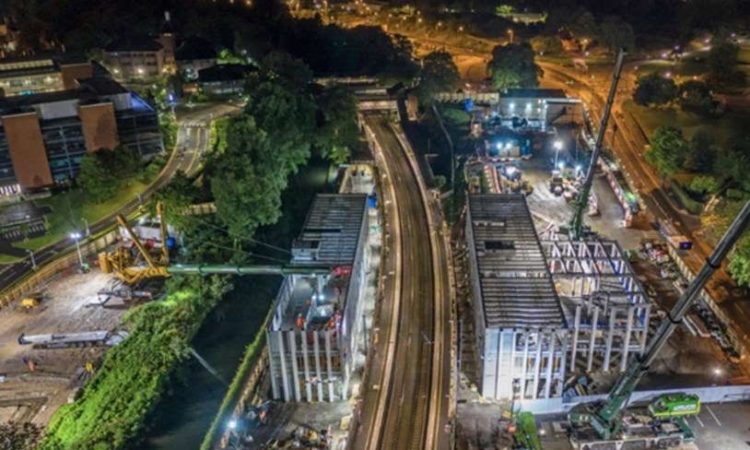Cross City Line passengers in Birmingham are travelling on a new fleet of trains from today (Monday 15 April).
West Midlands Railway (WMR) describes the entry into service of its Class 730 fleet, built in the Midlands by Alstom, as “the start of a new era for rail travel on the line”.
48 trains, three carriages each
The fleet is made up of forty-eight trains, each with three carriages, making a total of 144 new carriages.
The trains features spacious interiors with walk-through carriages, accessible toilets, WiFi and power points at every seat.
Previewed last month, the new trains will begin running in phases over spring and summer months, with the existing Class 323 withdrawn from service.
As a result, for the next few months, both classes of train will. be running on the Cross City Line. WMR expects that by autumn all 323s will have been withdrawn and only 730s will operate.
Today’s 6.06am departure from Birmingham New Street to Lichfield Trent Valley was the first journey taken by one of the new trains.
The Class 730s will run in pairs, with every train having six carriages and being capable of carrying more than a thousand passengers.
The new trains began running on the Wolverhampton-to-Walsall line in February.
The new fleet is part of the operator’s billion-pound investment in new trains and infrastructure. The fleet can carry one-third more passengers than the fleet it is replacing, which is thirty years old.
Millions of people travel on the Cross City Line each year, between Birmingham and destinations including Lichfield, Redditch, Sutton Coldfield, Longbridge and Bromsgrove.
The Line is one of the UK’s busiest commuter routes outside London, and connects major conurbations across the West Midlands region. The line includes the University station, which has recently been redeveloped.

More information on the fleet is available on WMR’s website.
“The introduction of this modern new train fleet marks the start of a new era for our customers on the Cross City Line.
“With extra space and modern features such as digital information screens and power points, the fleet will make a huge difference to millions of journeys across the West Midlands every year.
“The rollout of the Class 730s onto this key Birmingham commuter route is a vital part of our £1billion investment in new trains and infrastructure as we continue modernising our rail network.”
Ian McConnell, West Midlands Railway managing director,






Responses
I have to say that the new Class 730/0 are so nice as they are replacing the Class 323 and cascading the Class 323s to Northern. It’s about time that West Midlands needs more new trains and sending older trains up north.
Have been on the cross city line 3 times this week and have yet to see one. Let alone travel on one
I have seen these new trains being introduced to the timetable and am amazed at how unreliable they are. I understand there will be tethering problems with any mew trains but the couple of weeks I would say the train was cancelled 30%l of the time which is ridiculous. Even the drivers and conductors are saying how rubbish the new trains are. They are fed up with them. Sounds like there is a fundamental design fault with these trains
Thought this site was for Railway matters and not for A Political Rant 😞
New trains are an often overlooked advantage of privatisation. There have been many new trains in the last few years throughout the country. Including in our area of Greater Anglia, all new trains in the last 2 or 3 years. It is very unlikely that would happen if the railways had still been nationalised.
Sorry but that is complete and utter rubbish. Privatisation has resulted in far less money being available for new rolling stock, because the operators’ shareholders have to be paid their dividends – plus the deranged and utterly dysfunctional structure for the industry imposed on GB under the ‘privatisation’ model introduced the wholly-pointless leasing companies who own the trains and lease them to the operating companies. So a second profit margin is built into the procurement process. And of course the private train-builders need to return a profit to *their* shareholders, while British Rail Engineering Ltd didn’t.
So, in short, we would have had far more, far newer trains if the Tories hadn’t prioritised private profit over public service.
Sadly you are mistaken these trains are owned by a leasing company and will recoup upto 10 times what they paid for them
Had the DFT ordered them using public money and then made the TOCs pay the same as they will to the leasing companies they would have their money back within 4-5 years and then the money could be spent on other things or ordering more units
This story talks about the operators £1bn upgrade they haven’t invested anything other than the cost of training staff and the introduction of the stock